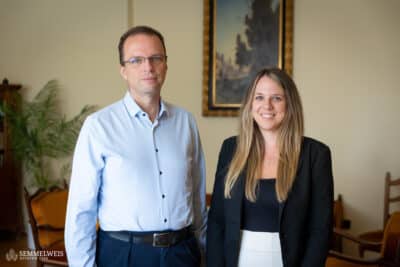Researchers of the Research Institute of Experimental Medicine belonging to the Eötvös Loránd Scientific Network discovered a regulatory mechanism in the embryonic nervous system that plays a key role in preventing fetal harm. The results were published in Nature Communications, a member of the internationally renowned, open-access Nature scientific family of journals. Zsófia László, member of the research group and shared first author of the article is a PhD student at Semmelweis University.
The article published in Nature Communications presents the results of the Momentum Laboratory of Molecular Neurobiology, Research Institute of Experimental Medicine led by Dr. István Katona and describes a phenomenon called “developmental homelessness”. The key element of the phenomenon is an enzyme (ABHD4) with a previously unknown function. The study presents the role of the enzyme and the developmental biological process in preventing fetal harm caused by excessive alcohol consumption of the mother. The shared first authors of the article are Zsófia László, PhD student of Semmelweis University and Dr. Zsolt Lele, researcher of the Research Institute of Experimental Medicine.
 The majority of human cells function in an ideal tissue microenvironment. If a cell loses contact and leaves the microenvironment, a special type of programmed cell death is triggered, which is called anoikis, meaning homelessness in Greek. Anoikis is particularly important in case of the continuous cell division of stem cells, because in case of tumour metastases tumour cells are able to escape the process of anoikis. The researchers studied how healthy cells that have to migrate far away from the place of their formation after cell division avoid this process. In addition, accidental or environmental effects, such as cell division and migration defects caused by maternal alcohol consumption, are inevitable in the developing brain. Their hypothesis was that there must be a defence mechanism in the developing brain that prevents the dividing neural stem cells from being misplaced and forming defective cell clusters or tumours by further division.
The majority of human cells function in an ideal tissue microenvironment. If a cell loses contact and leaves the microenvironment, a special type of programmed cell death is triggered, which is called anoikis, meaning homelessness in Greek. Anoikis is particularly important in case of the continuous cell division of stem cells, because in case of tumour metastases tumour cells are able to escape the process of anoikis. The researchers studied how healthy cells that have to migrate far away from the place of their formation after cell division avoid this process. In addition, accidental or environmental effects, such as cell division and migration defects caused by maternal alcohol consumption, are inevitable in the developing brain. Their hypothesis was that there must be a defence mechanism in the developing brain that prevents the dividing neural stem cells from being misplaced and forming defective cell clusters or tumours by further division.
Zsófia László and Dr. Zsolt Lele proved the phenomenon of developmental anoikis by a model developed by them and discovered the enzyme ABHD4, a protein of previously unknown function, as a key element of the process. They revealed that developmental anoikis linked to the enzyme is essential for cell death in the fetal brain caused by maternal alcohol consumption. Thus, their results greatly contribute to the understanding of microcephaly, a structural impairment of fetal alcohol syndrome. According to official critics, the study published in Nature Communications is a new concept in developmental neurobiology and opens up new horizons in the research of neuron formation.
Zsófia László studied at Neuromorphology and Cellular Biology Programme of Semmelweis University’s Doctoral School of Neurology. Her supervisor is Dr. Zsolt Lele, and she will present her doctoral dissertation on the same topic on 15th September. Her experimental work was carried out in the Molecular Neurobiology Research Group of the Institute of Experimental Medicine led by Dr. István Katona
Tamás Deme
Source: Eötvös Loránd Research Network
Photo: Nature publication (featured image), Zsófia László
Translation: Ágnes Raubinek


